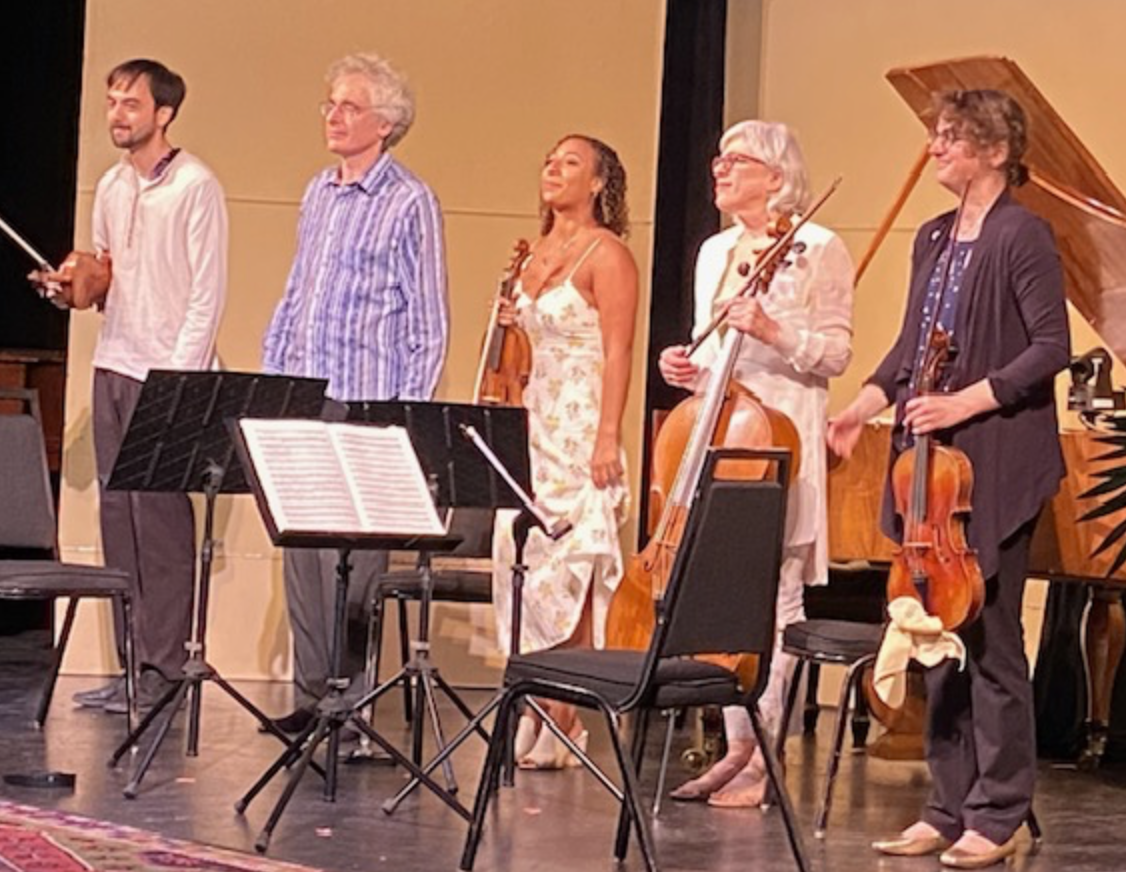|
Symphony
FROM THE NEW WORLD TO THE OLD WORLD
by Peter Lert
Saturday, June 14, 2025
Chamber
MC2 DUO RECITAL CLOSES 222'S SEASON
by Terry McNeill
Saturday, June 14, 2025
Choral and Vocal
CANTIAMO SONOMA'S LUSCIOUS A CAPELLA SINGING IN SEASON ENDING CONCERT
by Pamela Hicks Gailey
Sunday, June 8, 2025
Symphony
SRS SEASON ENDS WITH RESOUNDING TA-TA-TA-BANG
by Terry McNeill
Sunday, June 1, 2025
Symphony
YOUTHFUL VIRTUOSITY ON DISPLAY AT USO'S MAY CONCERTS
by Peter Lert
Saturday, May 17, 2025
Symphony
MYSTICAL PLANETS AND LIVELY GERSHWIN ORTIZ AT FINAL SRS CONCERT
by Peter Lert
Sunday, May 4, 2025
Symphony
VSO'S CONCERT MUSIC OF TIME, MUSIC OF PLACE
by Peter Lert
Sunday, April 27, 2025
VOCAL ELEGANCE AND FIRE AT THE 222'S RECITAL APRIL 26
by Pamela Hicks Gailey
Saturday, April 26, 2025
CANTIAMO SONOMA SINGS AN INSPIRED GOOD FRIDAY MOZART REQUIEM CONCERT
by Pamela Hicks Gailey
Friday, April 18, 2025
DRAMATIC SHOSTAKOVICH SYMPHONY CLOSES PHILHARMONIC'S 25TH SEASON
by Terry McNeill
Sunday, April 13, 2025
|
 |
 July 16 Schumann Quintet Performers |
SCHUMANN QUINTET PERFORMANCE RESCUES VOM FESTIVAL'S SECOND CONCERT
by Terry McNeill
Sunday, July 16, 2023
Concerts at the Valley of the Moon Music Festival, now in the ninth season, are frequently a mix of performances with professional-level interest and polish, and ones that never catch fire. It was that way July 16 in a Hanna Auditorium performance that was billed “the Piano as Orchestra.” No, no Wagner transcriptions or Bach-Busoni, but two sections of Clara Schumann and Chopin works, followed by Schumann's most popular chamber work.
Recently violinists have been playing Clara’s Three Romances, Op. 22, and here Ravenna Lipchik was joined by pianist Eric Zivian in a reading that was underplayed with timid violin thematic projection, thin tone that never soared, and pedestrian interpretation. Mr. Zivian’s always provocative phrasing almost saved the day, but convincing music was absent through the Andante and Allegretto. Ms. Lipchik’s violin line was often covered by the piano.
The finale, the most Robert Schumann of the movements, rippled along with Mr. Zivian making musical statements and the violin line sounding mundane.
Less than convincing playing continued with pianist Audrey Vardanega’s five Chopin works, attempting to make the c. 1841 piano have warmth and color that would take a listener away from the sound of a great modern concert grand. Alas, she could not, and the performance was burdened by cloudy runs, lack of bass response or pedal point, continual swaying of rhythms, and inaudible top treble notes in pianissimo. Ornaments were often rushed in the opening A Flat Major Waltz, Op. 69, No. 1, and in the magical B Major Nocturne (Op. 62, No. 1) Ms. Vardanega found some left-hand inner voices that offset her habit of clipping off phrase endings.
Though never sentimental, the interpretations of the A Minor Waltz (Op. 34) and the seminal D Flat Major Nocturne missed the aristocratic nature of the former, and technical command of the latter. In sum, the playing was superficial and, though at time with fast scales, mostly wooden. In the pianist’s defense, perhaps playing on a $250,000 Fazioli would have made Chopin’s music golden, but here it was just a shadow.
Rescuing the afternoon was a performance of Schumann’s ever-popular E-Flat Quintet, Op. 44 (1842), with Mr. Zivian being joined by violinists Keir GoGwilt and Carmen Johnson-Pájaro, violist Liana Bérubé and cellist Tanya Tomkins.
The reading throughout had the requisite energy and excitement, despite my unsteady relationship with the opening Allegro brillante theme that is repeated in several iterations nine times, though modulations help. The march movement ended with a lovely ensemble pianissimo. The crowning finale was played fast, as it should be, with Mr. Zivian giving the principal theme with many accented notes. The two fugal sections received ardent playing, and the audience of 125 rose in a prolonged standing ovation.
During the concert tuning for strings and the ancient piano (at A-430) was problematical, presumably because of Hanna’s good air conditioning.
Preceding the concert San Francisco based musicologist, producer, pianist and raconteur Nic McGegan gave the first of the Festival’s three Blattner Series lectures, an insouciant musical transversal of a history of keyboard instruments – “Every Home Should Have One.”
|

